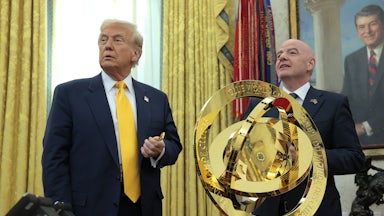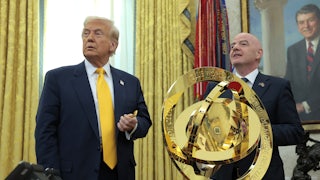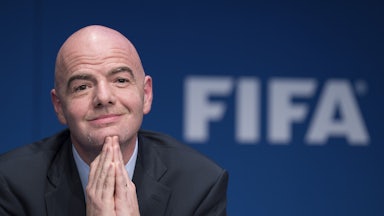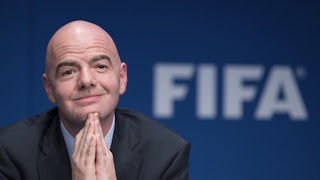On Monday, the English Premier League charged Manchester City Football Club—the most successful English soccer team of the last decade— with more than 100 violations of its economic regulations. The charges are unprecedented in their breadth: They essentially lay out a massive campaign of financial doping, dozens of instances of the club lying about or covering up where the money it was using to pay its players and staff was coming from in order to circumvent European regulations. The charges go back more than a decade, beginning in 2009, just a year after the United Arab Emirates bought the club. These allegations could have profound consequences, both for Manchester City and for the league that it has dominated: Suspensions, points penalties, and even relegation from the top flight could all follow.
No one in Manchester—or, for that matter, England—saw it coming. On Monday morning before the report dropped, Manchester City was licking its wounds after a surprise defeat on Sunday at Tottenham; the Premier League’s biggest story was the firing of Leeds United’s peppy American manager, Jesse Marsch. Now the most vaunted club in Europe’s most important soccer league was suddenly in existential crisis. And to keep the Premier League from being sucked into the vortex of this financial scandal, it will have to deal with the club—and deal with them in the harshest possible terms.
But if the story itself dropped with a shock, the details of the case weren’t entirely surprising. For one thing, European soccer’s governing body, the Union of European Football Associations, or UEFA, had already done its own investigation of Manchester City in 2018 and found much of what the Premier League’s inquiry did: secret payments to managers, fake and inflated sponsorship deals, a general and concerted effort to cook the books to make it easier for the club to bring in players. Manchester City was banned from European football for two seasons as a result of UEFA’s charges, but never faced any real consequences: It won an appeal in the summer of 2020.
But the real reason the charges were not all that surprising was simply because this is just how things work. That Manchester City was engaging in a form of legerdemain with its ledgers had been widely assumed ever since the United Arab Emirates purchased the team in 2007. Overnight, Manchester City had greater resources than all of England’s most storied clubs: more than its then mighty neighbor, Manchester United, and its then leading rival, Arsenal; even more than Chelsea, the oligarch-owned poster child of English soccer’s nouveau riche.
A relative minnow before the takeover, City quickly became a giant. The team has made the Champions League for the past 12 seasons and won six of the last 12 Premier League titles. It did so by being shrewd—its youth system is among the best in Europe—but mostly by being rich. For more than a decade it has attracted Europe’s top talent, as well as its best manager, Pep Guardiola. And the Premier League didn’t seem to really mind: Last year it allowed Saudi Arabia’s Public Investment Fund—an institution with close but (barely) deniable ties to the Saudi state and its murderous head, Mohammed bin Salman—to purchase Newcastle United. As far as the league’s gatekeepers were concerned, as long as the checks cleared, everything was fine.
Still, even if everyone did have nudge-nudge-wink-wink awareness of what was going on, the reports of City’s financial shenanigans paint a damning picture. Desperate for the minor advantages that lead to sporting success, the club relentlessly fudged its financial data, so it could more fully utilize its clear economic advantages. There is no salary cap in European soccer, but there are financial rules that govern how clubs can spend money that limit a wealthy owner—or sovereign state—from barging in and simply buying whichever players they like. The rules themselves essentially dictate that clubs can only spend a percentage of what they bring in, which is one reason why it is so important for teams to break into European competitions, but in the increasingly competitive Premier League, it is vital to qualify for the Champions League, which comes with a massive payday. Manchester City stands accused of fudging these rules. Specifically, it inflated the amount of money it was said to be bringing in and covered up its expenses—for instance, Roberto Mancini, who currently coaches Italy’s national team, was reportedly paid a secret off-book salary in addition to the one the club officially paid him.
The Premier League alleges that it has found breaches dating all the way back to 2009. Over that period, a number of Manchester City’s titles were won by the smallest of margins: Its first, in 2012, was won dramatically on the final match day of the season; in 2014, it won the league by two points; in 2019 and 2022, by just one point. It is impossible to prove that Manchester City’s financial shenanigans directly led to these titles, but it’s difficult to conclude they didn’t play some substantial role in this run of success. (To be fair, these allegations also show just how hard it is to win the Premier League—City cooked the books and often only narrowly edged out the competitions; the team has never won the Champions League.)
But there are bigger things at stake than just the fate of this club. These are allegations that cut to the heart of the integrity of the Premier League itself. A certain level of unfairness—indeed a great deal of unfairness—is baked into European soccer’s financial rules: Bigger, more successful teams get to spend more money; as long as that money is reasonably well spent, they have an enormous advantage over the competition. But Manchester City was secretly playing by its own rules—rules that allowed it to better utilize its extraordinary financial resources in a way that skewed what passes in the league for competitive balance and financial fair play. Manchester City has dragged the entire league to the brink. Fairness is a necessity in sports; it now seems fairly clear that the Premier League is not and has not been fair for quite some time.
The crisis is both inevitable and potentially repeatable. By allowing sovereign states with massive cash reserves to enter the Premiership, the league was flirting with disaster even as profits soared and the league came to dominate the European landscape. Manchester City has splashed a ton of cash around; it has, particularly over the last five years, been one of Europe’s biggest and most exciting clubs. But it has also corrupted the competitive balance of English soccer. It’s hard to imagine the league’s boom continuing if one of the teams it harbors spent one-half of the last decade cheating; doubly so if those cheaters continue to prosper.
Some have cynically alleged that the Premier League has pushed the investigation as a means of getting ahead of a white paper set to be released by the United Kingdom government that would make the case for an independent regulator for English soccer—the Premier League and most of its teams oppose the plan. But if that were the case, the investigation into City is an own goal. Rather than show the Premier League’s ability to regulate itself, it shows the opposite: For 14 years, the league’s biggest team was cooking the books. The Premier League clearly is incapable of regulating itself.
The only way forward is to throw the book at Manchester City, to dock dozens of points from the team, and relegate it to England’s second division, as happened to Italian side Juventus during the Calciopoli scandal. It would be both an extraordinary punishment and arguably insufficient: City would likely miss a year or more of European soccer at most. It would have to sell many of the stars that currently glitter its roster; but it would also almost certainly return to the Premier League in one year and European competition shortly after that, which means it will remain an attractive club for the world’s greatest players.
There’s no guarantee that a punishment will act as a deterrent. Even after its banishment from Italy’s top division, Juventus has once again mired itself in serious legal trouble related to financial malfeasance. The team was just docked 15 points in Italian Serie A—though, ironically, the Italians were cooking their books in a desperate attempt to keep up with clubs like Manchester City. Still, the Premier League doesn’t have a choice. A light punishment will only encourage more financial malfeasance. Hate to say I told you so, but, having welcomed nation-states into the league, the Premier League is now faced with the delicate challenge of having to clean up a mess of its own making. Then it should have to face the music itself.










